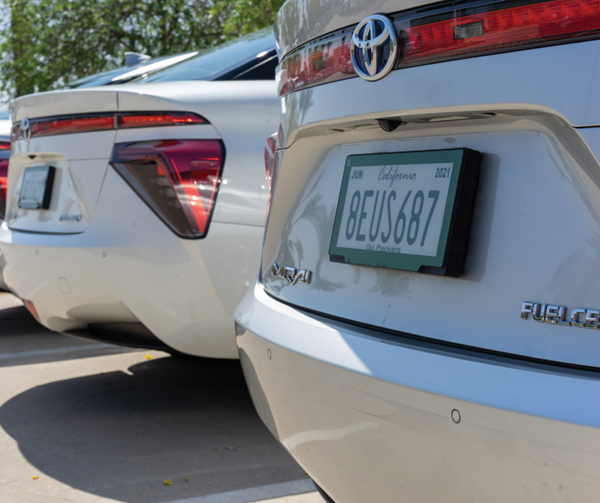The Last Word
Can Digital License Plates Lower Insurance Costs?
The technology involved has the potential to combat fraud and theft and identify uninsured motorists.

Photo courtesy of Reviver
You can learn a lot about a driver from their vehicle's vanity license plate. Now imagine a plate that not only shares a person's job, hobby or favorite sports team but also automatically renews a vehicle's registration, reveals if a vehicle is stolen and potentially saves lives.
A growing movement to swap old-school, stamped-metal license plates for digital counterparts is capturing the attention of drivers, along with auto insurers who can use the devices to combat fraud and potentially identify uninsured motorists.
There are significant cost savings to be had from technology that alerts insurers and other stakeholders when an insured vehicle is stolen or involved in an accident, said Michael Anderson, vice president of corporate communications and marketing at Reviver, a California startup that created digital license plates in 2009.
“Once there is a police report of the [theft], we can push an image that says 'Stolen' onto the digital license plate, something you can't do with a steel plate,” he said.
The plates also have the potential to display public service announcements as well as targeted messaging, Amber Alerts and Silver Alerts for missing persons. California and Arizona now allow the use of digital plates but Anderson said he expects Texas, Florida and others currently piloting Reviver's digital Rplates to soon join the list.
Rplates, along with Reviver's Rplate Pro that offers telematics capabilities, have an e-ink display often seen on e-book readers such as the Amazon Kindle. The digital screens, which connect wirelessly to mobile phone networks, can display custom messages approved by states' motor vehicle departments, and allow motorists to automatically renew their vehicle registration via an encrypted app.
Digital plates come at a cost—$499 to be exact, along with a small monthly network connection fee for one rear Rplate. But Anderson said users can't put a price tag on the time savings of digital registration renewal and security that comes from technology that allows Rplate Pro users to monitor the status and driving behaviors of individuals.
The rise of digital license plates is raising a number of questions within the insurance industry. For example, could auto insurers one day consider digital plates anti-theft devices and offer premium discounts to policyholders who use them? Alex Hageli, director of personal auto at the American Property Casualty Insurance Association, said the industry remains in a “wait-and-see” mode when it comes to the technology. For now, he is excited about the introduction of new digital capabilities into the sector, he said, but also concerned consumers could push back on the tracking technology.
“Your smartphone already tracks you. We do not,” Reviver's Anderson said. “Also, Rplate owners own their data, and we do not share that information with any third parties.”
The move to digital plates raises another red flag—the threat of hacking. Anderson points to Rplate's three-key encryption protocols that he said puts its security on a similar level to that used by financial institutions.
Anderson said he foresees widespread adoption of digital license plates for both personal and commercial use, and expects nearly 100,000 Rplated-vehicles will be on the road by the end of this year.



























